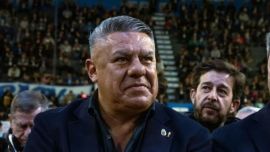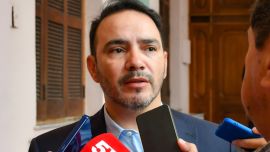Who rules Argentina? The current consensus is that Cristina Fernández de Kirchner runs the country by remote control, which is tough on Alberto Fernández who, while he often seems baffled by the orders she gives him, when he does understand them he promptly obeys. As for the main opposition alliance, it has yet to recover from the defeat it suffered over a year ago; to the surprise of many, it shows no signs of falling apart. And though former president Mauricio Macri kept fairly quiet for most of last year before re-entering the fray, his laid-back approach worries those who are closely connected to him and encourages others, such as Horacio Rodriguez Larreta, Patricia Bullrich and Alfredo Cornejo, to manoeuvre in the hope of getting anointed as his successor.
All this is normal enough when a party or its equivalent is in opposition, but Argentines tend to be more prone than others to put their faith in individuals rather than in ideologies or “doctrines,” as Radicals like to call them. So were an accepted leader to arise, the heirs to the “Let’s Change” coalition would be well placed to make gains in this year’s parliamentary elections and then win, perhaps by a landslide, the big presidential one which is scheduled for 2023.
Meanwhile, would-be contenders and their friends will continue making snide comments about one another. This is something Senator Martín Lousteau who, believe it or not, was one of Cristina Fernández de Kirchner’s economy ministers before going into opposition after she dispensed with his services, is fond of doing. Last week he raised many hackles by suggesting that Macri should rest on his laurels instead of trying to play a leading role in the “Together for Change” (the current name for the “Let’s Change” alliance) coalition he did so much to create.
While some thought Lousteau – who evidently fancies his own chances of getting chosen one day to guide Argentina out of the desert in which she has been wandering for decades in her fruitless search of salvation – was being terribly unkind when he hinted that Macri would be well advised to go into retirement, others mocked him for allegedly imagining that the former president had bequeathed to his successors anything that might be thought worth preserving. As far as these are concerned, his term in office was such an abject failure that it would be better for everyone if he stopped dreaming of making a comeback.
Was Macri’s government as inept and divisive as not only his Kirchnerite critics but also some who once supported him say? Only if you assume that any half-decent president would have found it easy enough to balance the books, lower inflation and bring about a business environment which investors, whether local or foreign, would have found so irresistible billions of dollars would have come pouring in, while also sticking up for the rule of law and stamping out corruption in high places. No doubt Macri, like Fernando de la Rúa before him, wanted to do all this and even thought he could succeed, but Argentina’s political realities being what they are, had he made a forceful attempt to carry out such a programme before the expected foreign investments arrived, he would have almost certainly detonated the violent rebellion, with large-scale riots and blood in the streets, that die-hard Kirchnerites were praying for from the very moment he took over. This was the main reason he opted for a “gradualist” approach which, as things turned out, fell short because one day the markets rightly decided it was getting nowhere. When being swept downriver by a raging torrent, simply treading water and promising to do better in future is not much help.
Even so, the inability of Macri to overcome the structural weaknesses of Argentina’s ramshackle economy while he was in office tells us less about the man himself than about what any reformer, no matter how strong-willed and administratively talented, would have found himself up against. After Cristina’s government had done its bit to make sure that the next president would be forced to choose between taking many highly unpopular measures and leaving things much as they were in the hope that somehow or other the economic situation would improve, Macri’s government found itself boxed in from the very beginning. He knew he would be damned if he made a serious effort to cut public spending and, as the months passed, learned he would be doubly damned if he did not.
In addition to berating him for not managing to inject some much needed dynamism into the Argentine economy, Lousteau and some other members of the Radical faction of the opposition alliance think Macri should have been far more willing to offer high-level jobs in the government set-up to Peronists who, by and large, approved of his overall strategy insofar as it entailed making Argentina more business-friendly. They have a valid point. If in addition to bringing in Miguel Ángel Pichetto and making him his running-mate in the 2019 election campaign, Macri had forgiven Sergio Massa his many attempts to trip him up, he might have prevented Cristina from putting together the Peronist coalition that took her back into power. Despite the economic meltdown that had ruined his term in office, when the votes were counted the difference between him and the winner was far smaller than had seemed inevitable just a few weeks earlier.
However, Macri, like many other people, greatly distrusts Massa. He had also persuaded himself that most of the electorate had finally come to the conclusion that it was time to say goodbye to the movement that had dominated the country, to disastrous effect, for well over half a century, and suspected that incorporating more Peronists into his administration would reduce even further its chances of achieving anything useful.
Politics is an unforgiving trade. As things stand, Macri looks unlikely to get a second chance; he is not an inspiring leader and, in any case, there are plenty of other people, among them Lousteau, who want him to take a backseat so they can move higher up that slippery pole they find so tempting. However, if they insist on treating him as a pathetic amateur who should never have become president, they will only harm the opposition alliance they all depend on. Infighting among politicians may be normal, but in times like these it does not go down very well with the general public.
This does not mean what is going on in opposition circles is unimportant. Unless they come up with someone who has enough charisma to give them not just strong leadership but also large numbers of votes, the many who think the government formally headed by Alberto would be even worse were it not almost comically incompetent, will just have to pray that by mid-2023 more people than was the case four years earlier feel so appalled by Kirchnerite misbehaviour that they will support any reasonable alternative, no matter how unexceptional he or she might seem to those who would like the country to be led by a statesperson of heroic stature.























Comments